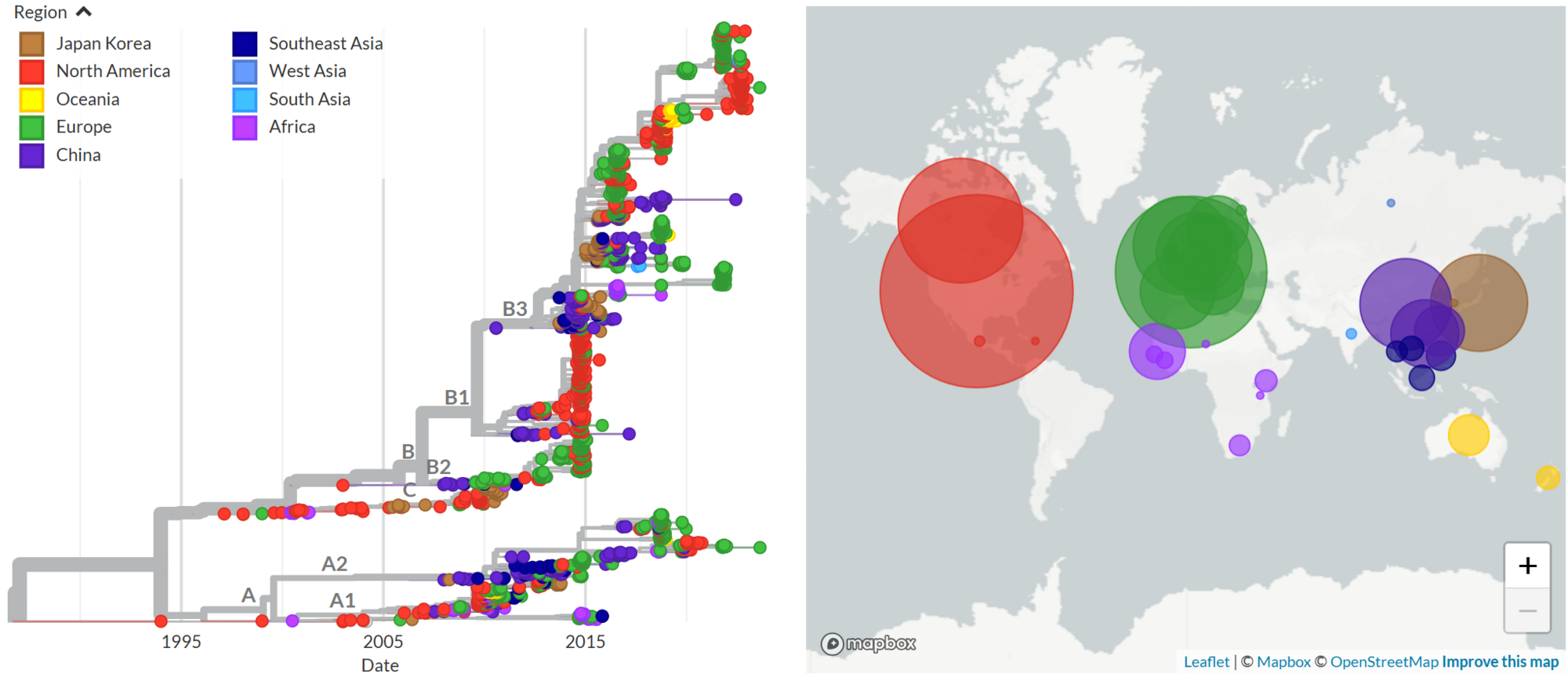Group | Epidemiology and Viral Evolution
The Epidemiology and Viral Evolution (EVE) Group is dedicated to better understanding how viruses and humans influence and interact with each other using phylogenetics, modelling and computational analysis. Through human immunity, contact networks, travel and behaviour, we constantly challenge how viruses can be transmitted, and viruses in turn must adapt to continue infecting us while competing with other viruses. At EVE, we use computational tools and models to combine viral sequence data with demographic and immunological information to gain deeper insights into the ever-evolving 'dance' between viruses and humans.

Emma Hodcroft
Dr.
Group Leader
+41612848247
,
*
emma.hodcroft@swisstph.ch
Key Projects
Global Phylodynamics and Antigenic Evolution of Non-Polio Enteroviruses
This project focuses on non-polio enteroviruses (NP-EVs), which mainly affect young children and can lead to severe outcomes like meningitis, encephalitis, and paralysis. The goal is to examine the epidemiology of NP-EVs, including their geographic spread, transmission patterns, and outbreak dynamics, while developing a standardized phylogeny-based naming system. The project will also explore antigenic evolution and recombination in NP-EVs, with a special focus on EV-D68, looking at factors like reinfection, waning immunity, and immune pressure on viral epitopes. Using an open-source resource on Nextstrain, the research will facilitate real-time tracking of NP-EV evolution and spread. By addressing key gaps in our understanding of NP-EVs, this project will help improve preparedness for potential outbreaks and guide more effective public health responses.
Molecular Epidemiology and Antigenic Evolution of Seasonal Human Coronaviruses
This project investigates the persistence and evolution of seasonal human coronaviruses (HCoVs) by exploring their evolutionary relationships through real-time phylogenies and recombination analysis. It focuses on identifying antigenic changes in HCoVs by examining the nucleocapsid protein, which will be used to develop an ELISA assay for exposure and immunity testing. Serological samples from Ghana will be tested to track immunity and exposure patterns, alongside nasopharyngeal samples for sequencing. The project will also integrate phylogeographic data and serological findings into models to study reinfection dynamics, waning immunity, and transmission across different age groups and geographies. Ultimately, this research aims to improve understanding of HCoV evolution, immunity, and transmission, helping to inform strategies for managing future outbreaks.
Recombination Dynamics in Vaccine-Derived Polioviruses
We are investigating the genetic diversity and recombination dynamics of vaccine-derived polioviruses (VDPVs), which have emerged as the primary cause of poliomyelitis since 2017. By analyzing publicly available poliovirus and non-poliovirus enterovirus C (EV-C) sequences, the research aims to construct updated phylogenetic trees of the EV-C species and identify novel recombinant VDPVs. The study also examines key mutations in VDPV sequences associated with virulence and attenuation, determining their frequency and origin through recombination or single-site mutations. This comprehensive analysis aims to provide a deeper understanding of the evolutionary mechanisms driving VDPV phenotypic adaptation, which is crucial for improving vaccine strategies and eradicating poliomyelitis.
Latest Publications
Germuskova Z et al. Conference report: the first bacterial genome sequencing pan-European Network Conference. Microbes Infect. 2024;26(8):105410. DOI: 10.1016/j.micinf.2024.105410
Subissi L et al. An updated framework for SARS-CoV-2 variants reflects the unpredictability of viral evolution. Nat Med. 2024;30:2400-2403. DOI: 10.1038/s41591-024-02949-0

 Emma Hodcroft
Emma Hodcroft
 Nosihle Msomi
Nosihle Msomi
 Nadia Neuner-Jehle
Nadia Neuner-Jehle